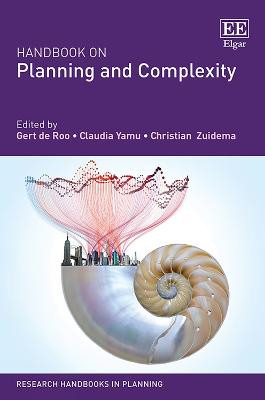Description
Building on the notion that cities have fractal-like structures, chapters look at their behaviour as complex adaptive systems, with co-evolving trajectories and transformative forces. The Handbook offers new perspectives, concepts, methods and tools for understanding the inter-relations between complexity and planning, including: adaptive planning, non-linear types of rationality, governance and decision-making, and different methods of experimental learning.
Planning, complexity, urban studies and social geography scholars will appreciate the examples of complex urban behaviour and urban planning throughout the Handbook. This will also be an important read for modellers in urban development, urban policy makers and spatial planners.
Contributors include: E.R. Alexander, Y. Asami, M. Batty, R. Beunen, B. Boonstra, S.D. Campbell, S. Cozzolino, M. Duineveld, S. Eraranta, N. Frantzeskaki, T. Ishikawa, W. Jager, D. Loorbach, S. Moroni, C. Perrone, J. Portugali, W. Rauws, N.A. Salingaros, K. Van Assche, A. van Nes, S. Verweij, T. Von Wirth, M. Zellner,
About the Author
Edited by Gert de Roo, Professor in Spatial Planning, University of Groningen, the Netherlands, Claudia Yamu, Department of Built Environment, Oslo Metropolitan University, Norway and Christian Zuidema, Associate Professor in Environmental Planning, Department of Spatial Planning & Environment, University of Groningen, the Netherlands
Reviews
'The editors have brought together leading and upcoming experts in complexity and planning to create this 'state of the art' volume. It is wide ranging, thought provoking and comprehensive, covering the latest theoretical debates in complexity and planning, international and national applications, and even localised planning issues. It is a 'must read' for anyone working in planning and complexity and will undoubtedly be a benchmark for the next wave of works on complexity and planning and policy-making in general.'
--Robert Geyer, Lancaster University, UK
'This excellent collection of chapters makes a direct contribution to understanding how planning interventions can interact with and rise above the self-organising forces of complexity and uncertainty. The threads of governance, rationality, modelling, communication, contextualisation and adaptability are interwoven across different chapters. By breaking down the divide between technical and political approaches, between theory and methods, the book is charged with positive energy and inspirational ideas to pursue more discursive and non-linear thinking in spatial planning.'
--Cecilia Wong, University of Manchester, UK
'This volume critically engages complexity thinking to identify possibilities for the reinvention of spatial planning as a meshwork of complementary mutual interrelations, purposeful interventions and subjective interactions. The book is an important source for scholars interested in pushing forward the frontiers of theoretical reasoning and practical modelling in the dynamic, non-linear world in which we live.'
--Jean Hillier, RMIT University, Australia
Book Information
ISBN 9781786439178
Author Gert de Roo
Format Hardback
Page Count 416
Imprint Edward Elgar Publishing Ltd
Publisher Edward Elgar Publishing Ltd





